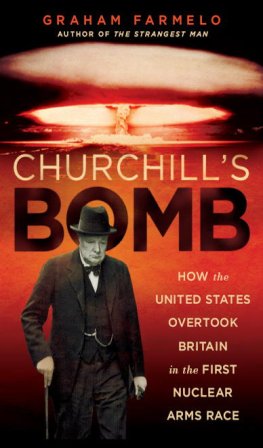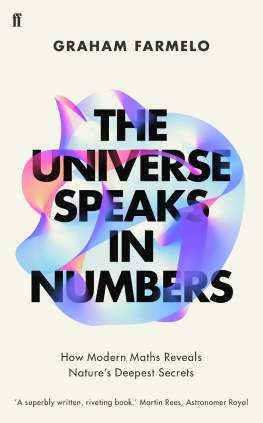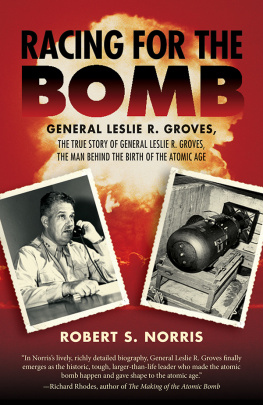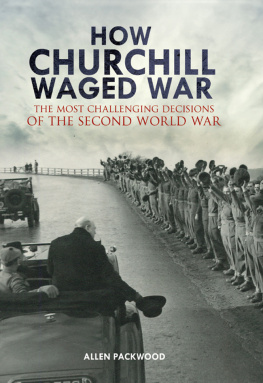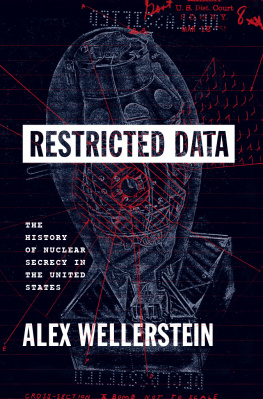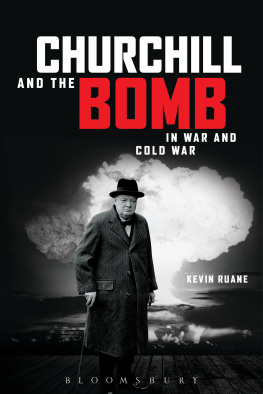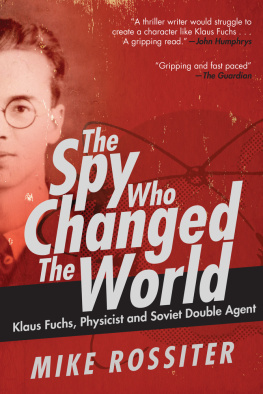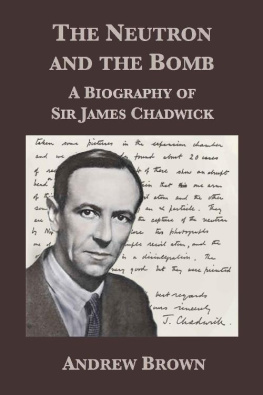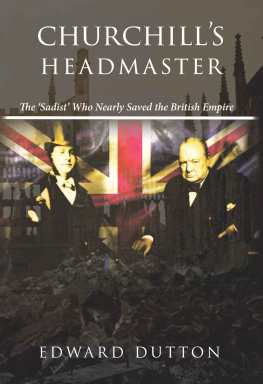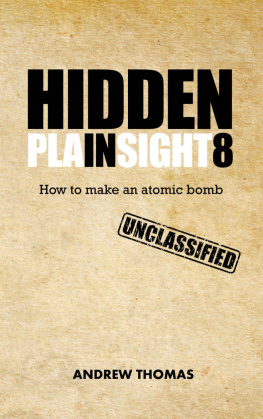Graham Farmelo
CHURCHILLS BOMB

How the United States Overtook Britain in the First Nuclear Arms Race

In the next fifty years mankind will make greater progress in mastering and applying natural forces than in the last million years or more. And the first question we must ask ourselves is: Are we fit for it? Are we worthy of all these exalted responsibilities? Can we bear this tremendous strain?
WINSTON CHURCHILL, 14 November 1937
Scientists on the whole are a very docile lot. Apart from their own particular job they do just what they are told and are content to sit down and be very minor entities.
MARK OLIPHANT, 20 April 1940
Devil: In the arts of life Man invents nothing; but in the arts of death he outdoes Nature herself his heart is in his weapons. This marvellous force of Life of which you boast is a force of Death: Man measures his strength by his destructiveness.
GEORGE BERNARD SHAW,
Man and Superman, 1903
FEBRUARY 1955
Churchill, his nuclear scientists and the Bomb
I do not pretend to be an expert or to have technical knowledge of this prodigious sphere of [nuclear] science. But in my long friendship with [Frederick Lindemann] I have tried to follow and even predict the evolution of events.
WINSTON CHURCHILL to the Commons, 1 March 19551
His swansong was sure to have a nuclear theme. In February 1955, when Churchill was eighty years old and inching reluctantly towards his resignation as Prime Minister, he set his heart on making one last great speech in the Commons. The hydrogen bomb, his obsession, supplied the perfect theme it made all the other business of the day look trifling. As he had told his doctor a few months before: I am more worried by [the H-bomb] than by all the rest of my problems put together.2
The H-bomb was, Churchill believed, the greatest threat to civilisation since the Mongols began their conquests three-quarters of a millennium before.3 This threat had become a monomania for him, driving his final great diplomatic initiative: to bring the Soviet Union and the United States together to ease the tensions of the Cold War and so minimise the risk that H-bombs would be used.4 He was certainly going to mention that campaign in his speech, but his main task was to argue that the UK must acquire the weapon he feared so much, as a deterrent to the Soviet Union. This argument was almost certain to win the day in the Commons his main challenge was to give his country a sense of hope at a time when the world seemed to be careering towards a nuclear holocaust.
He threw himself into the speech, researching the nuclear story and his role in it, all the way back to the articles he had written in the 1920s and 1930s about the potential of nuclear energy to change the world. Among the best of the pieces was Fifty Years Hence, a four-thousand-word speculation on the effects science might have on life in the future, first published in late 1931. In it, he drew attention to the likely advent of nuclear weapons and the challenges their invention would pose. He even glimpsed the destructive power of the H-bomb, which would be detonated for the first time twenty-one years later:5
High authorities tell us that new sources of power, vastly more important than any we yet know, will surely be discovered. Nuclear energy is incomparably greater than the molecular energy which we use today If the hydrogen atoms in a pound of water could be prevailed upon to combine together and form helium, they would suffice to drive a thousand horse-power engine for a whole year There is no question among scientists that this gigantic source of energy exists
Churchill had based the article on a draft by his scientific Grand Vizier, Frederick Lindemann, an acid-tongued professor of physics at the University of Oxford. Lindemann was one of the best scientists and best brains in the country, in Churchills opinion, a view not shared by many leading academics.6 To most of them, the Prof, as Churchill called him, was a distinguished scientist with a gift for summarising complex arguments simply and accurately, but not a deep or imaginative thinker and certainly not an expert on nuclear science.
One of the services the Prof rendered to his admiring friend was to nourish his inquisitive mind with briefings on the latest advances in basic science. In the spring of 1926, when the new and revolutionary quantum theory of matter was the talk of physicists, Lindemann sent Churchill then Chancellor of the Exchequer a book on how the structure of atoms can be understood using basic quantum ideas. The text grabbed Churchills attention so completely that, for a few hours, he was incapable of concentrating on his Budget.
A few years later, Lindemann kept Churchill abreast of the headline-making advances in nuclear physics made by Ernest Rutherford and his colleagues at Cambridge University, including the first artificial splitting of the atom. Soon afterwards, Churchill marvelled at the scientists achievements and said so after chairing one of Lindemanns non-specialist talks on nuclear physics: Here is this great study of science proceeding.7 The Prof ensured that Churchill had been aware of the opportunities and threats of nuclear technology for longer than any other leading politician, living or dead. In return, Churchill made his friend one of the most politically influential scientists ever to serve in government.
The speech Churchill was preparing in late February 1955 was part of his final bid for a glorious place in Britains post-war history, having positioned himself as a link between the reigns of the British Empires two most recent queens.8 During the closing years of Victorias reign, he had read about the widely publicised discovery of radioactivity, which involved the release of nuclear energy, as scientists later understood. Now, in the new Elizabethan era, he was commissioning a weapon that would release this energy with a destructiveness he had first fully appreciated only a year before, when he read a front-page article in the Manchester Guardian, Devastation and the Hydrogen Bomb. It almost made the eyes stand out of his head, as he told President Eisenhower a few months later.9
His colleagues in Parliament were now expecting a great speech from him, to round off his second premiership. Although they all knew of his obsession with the H-bomb, few of them appreciated the full extent of his involvement in the development of nuclear weapons. The handful in Whitehall who were familiar with the details of his record knew that it had been not been especially distinguished by his standards. He had almost always responded to events rather than shaping them, had shown poor judgement in his choice of advisers, and demonstrated none of his fabled vision and imagination until it was too late.
It was without doubt a misfortune for him that he had to think about the possibility of nuclear weapons when he was also deeply involved in the tumult of a global war. The news from Birmingham that two enemy aliens as the government classified them had discovered a viable way of making a nuclear bomb arrived in Whitehall less than two months before he first became Prime Minister in May 1940. During most of the next two years, Churchills pool of nuclear advice was too narrow and too shallow. Most damagingly, he froze out Henry Tizard, Britains leading expert on the application of science to military problems a decision that dismayed many leading scientists. The computer pioneer and former radar engineer Sir Maurice Wilkes later remembered: Scientists offered the Prime Minister the man best able to give their consensus, but he chose a maverick.10 Churchill discussed the new explosives, as he usually called nuclear weapons before they became a reality, only with Lindemann and with their colleague Sir John Anderson, keeping it secret from almost the entire Cabinet for most of the war. He demonstrated neither his usual sure-footedness nor any of his habitual enthusiasm for innovative new weapons, such as during World War I the tank.11

